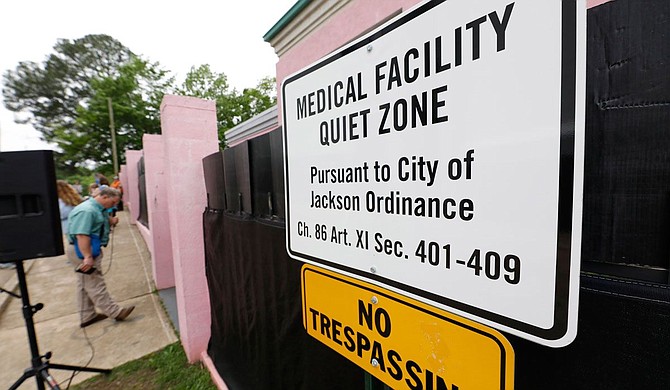The Mississippi attorney general’s office is expected to file briefs with the U.S. Supreme Court on Thursday to outline the state’s arguments in a case that could upend nearly 50 years of court rulings on abortion rights nationwide. Photo by Rogelio V. Solis via AP
JACKSON, Miss. (AP) — The Mississippi attorney general’s office is expected to file briefs with the U.S. Supreme Court on Thursday to outline the state’s arguments in a case that could upend nearly 50 years of court rulings on abortion rights nationwide.
A 6-3 conservative majority, with three justices appointed by former President Donald Trump, said in May that the court would consider arguments over a Mississippi law that would ban abortion at 15 weeks. Justices are likely to hear the case this fall and could rule on it in the spring.
The case challenges rulings that have prohibited states from restricting abortion before a fetus can survive outside the womb.
Abortion rights supporters have said that if justices uphold the Mississippi law, that could clear the way for states to enact more restrictions on the procedure, including bans on abortion once a fetal heartbeat is detected, as early as six weeks.
The Mississippi 15-week law was enacted in 2018, but was blocked after a federal court challenge. The state’s only abortion clinic, Jackson Women's Health Organization, remains open and offers abortions up to 16 weeks of pregnancy. Clinic director Shannon Brewer has said about 10% of its abortions there are done after the 15th week.
More than 90% of abortions in the U.S. take place in the first 13 weeks of pregnancy, according to the Centers for Disease Control and Prevention.
The Mississippi clinic has presented evidence that viability is impossible at 15 weeks, and an appeals court said that the state “conceded that it had identified no medical evidence that a fetus would be viable at 15 weeks.” Viability occurs roughly at 24 weeks, the point at which babies are more likely to survive.
But the state has argued that viability is an arbitrary standard that doesn’t take sufficient account of the state’s interest in regulating abortion.
The Mississippi law would allow exceptions to the 15-week ban in cases of medical emergency or severe fetal abnormality. Doctors found in violation of the ban would face mandatory suspension or revocation of their medical license.
Republican lawmakers in several states have been pushing laws designed to challenge Roe v. Wade, the 1973 Supreme Court ruling that legalized abortion nationwide. A federal district judge on Tuesday blocked an Arkansas law that would ban most abortions, ruling that the law is “categorically unconstitutional” because it would ban the procedure before the fetus is considered viable.



Comments
Use the comment form below to begin a discussion about this content.
comments powered by Disqus